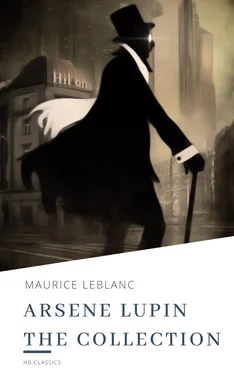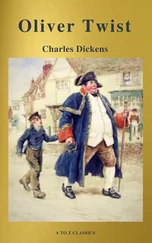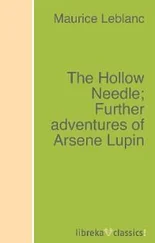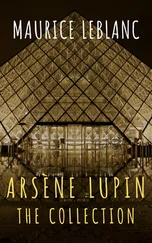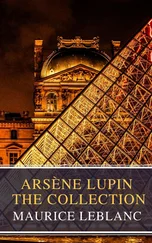Isidore, as it was, had been careful not to visit Gaffer Charel's hovel except with the greatest precautions and in such a way as not to give an alarm. He now decided not to go back to it. He made inquiries and learnt that Friday was market-day at Fresselines, a fair-sized town situated a few leagues off, which could be reached either by the rather winding highroad or by a series of short cuts.
On the Friday, he chose the road and saw nothing that attracted his attention, no high walled enclosure, no semblance of an old castle.
He lunched at an inn at Fresselines and was on the point of leaving when he saw Gaffer Charel arrive and cross the square, wheeling his little knife-grinding barrow before him. He at once followed him at a good distance.
The old man made two interminable waits, during which he ground dozens of knives. Then, at last, he went away by a quite different road, which ran in the direction of Crozant and the market-town of Eguzon.
Beautrelet followed him along this road. But he had not walked five minutes before he received the impression that he was not alone in shadowing the old fellow. A man was walking along between them, stopping at the same time as Charel and starting off again when he did, without, for that matter, taking any great precautions against being seen.
"He is being watched," thought Beautrelet. "Perhaps they want to know if he stops in front of the walls—"
His heart beat violently. The event was at hand.
The three of them, one behind the other, climbed up and down the steep slopes of the country and arrived at Crozant, famed for the colossal ruins of its castle. There Charel made a halt of an hour's duration. Next he went down to the riverside and crossed the bridge.
But then a thing happened that took Beautrelet by surprise. The other man did not cross the river. He watched the old fellow move away and, when he had lost sight of him, turned down a path that took him right across the fields.
Beautrelet hesitated for a few seconds as to what course to take, and then quietly decided. He set off in pursuit of the man.
"He has made sure," he thought, "that Gaffer Charel has gone straight ahead. That is all he wanted to know and so he is going— where? To the castle?"
He was within touch of the goal. He felt it by a sort of agonizing gladness that uplifted his whole being.
The man plunged into a dark wood overhanging the river and then appeared once more in the full light, where the path met the horizon.
When Beautrelet, in his turn, emerged from the wood, he was greatly surprised no longer to see the man. He was seeking him with his eyes when, suddenly, he gave a stifled cry and, with a backward spring, made for the line of trees which he had just left. On his right, he had seen a rampart of high walls, flanked, at regular distances, by massive buttresses.
It was there! It was there! Those walls held his father captive! He had found the secret place where Lupin confined his victim.
He dared not quit the shelter which the thick foliage of the wood afforded him. Slowly, almost on all fours, he bore to the right and in this way reached the top of a hillock that rose to the level of the neighboring trees. The walls were taller still. Nevertheless, he perceived the roof of the castle which they surrounded, an old Louis XIII. roof, surmounted by very slender bell-turrets arranged corbel- wise around a higher steeple which ran to a point.
Beautrelet did no more that day. He felt the need to reflect and to prepare his plan of attack without leaving anything to chance. He held Lupin safe; and it was for Beautrelet now to select the hour and the manner of the combat.
He walked away.
Near the bridge, he met two country-girls carrying pails of milk. He asked:
"What is the name of the castle over there, behind the trees?"
"That's the Chateau de l'Aiguille, sir."
He had put his question without attaching any importance to it. The answer took away his breath:
"The Chateau de l'Aiguille?—Oh!—But in what department are we? The Indre?"
"Certainly not. The Indre is on the other side of the river. This side, it's the Creuse."
Isidore saw it all in a flash. The Chateau de l'Aiguille! The department of the Creuse! L'AIGUILLE CREUSE! The Hollow Needle! The very key to the document! Certain, decisive, absolute victory!
Without another word, he turned his back on the two girls and went his way, tottering like a drunken man.
Chapter 6
An Historic Secret
Beautrelet's resolve was soon taken: he would act alone. To inform the police was too dangerous. Apart from the fact that he could only offer presumptions, he dreaded the slowness of the police, their inevitable indiscretions, the whole preliminary inquiry, during which Lupin, who was sure to be warned, would have time to effect a retreat in good order.
At eight o'clock the next morning, with his bundle under his arm, he left the inn in which he was staying near Cuzion, made for the nearest thicket, took off his workman's clothes, became once more the young English painter that he had been and went to call on the notary at Eguzon, the largest place in the immediate neighborhood.
He said that he liked the country and that he was thinking of taking up his residence there, with his relations, if he could find a suitable house.
The notary mentioned a number of properties. Beautrelet took note of them and let fall that some one had spoken to him of the Chateau de l'Aiguille, on the bank of the Creuse.
"Oh, yes, but the Chateau de l'Aiguille, which has belonged to one of my clients for the last five years, is not for sale."
"He lives in it, then?"
"He used to live in it, or rather his mother did. But she did not care for it; found the castle rather gloomy. So they left it last year."
"And is no one living there at present?"
"Yes, an Italian, to whom my client let it for the summer season: Baron Anfredi."
"Oh, Baron Anfredi! A man still young, rather grave and solemn- looking—?"
"I'm sure I can't say.—My client dealt with him direct. There was no regular agreement, just a letter—"
"But you know the baron?"
"No, he never leaves the castle.—Sometimes, in his motor, at night, so they say. The marketing is done by an old cook, who talks to nobody. They are queer people—"
"Do you think your client would consent to sell his castle?"
"I don't think so. It's an historic castle, built in the purest Louis XIII. style. My client was very fond of it; and, unless he has changed his mind—"
"Can you give me his name and address?"
"Louis Valmeras, 34, Rue du Mont-Thabor."
Beautrelet took the train for Paris at the nearest station. On the next day but one, after three fruitless calls, he at last found Louis Valmeras at home. He was a man of about thirty, with a frank and pleasing face. Beautrelet saw no need to beat about the bush, stated who he was and described his efforts and the object of the step which he was now taking:
"I have good reason to believe," he concluded, "that my father is imprisoned in the Chateau de l'Aiguille, doubtless in the company of other victims. And I have come to ask you what you know of your tenant, Baron Anfredi."
"Not much. I met Baron Anfredi last winter at Monte Carlo. He had heard by accident that I was the owner of the Chateau de l'Aiguille and, as he wished to spend the summer in France, he made me an offer for it."
"He is still a young man—"
"Yes, with very expressive eyes, fair hair—"
"And a beard?"
"Yes, ending in two points, which fall over a collar fastened at the back, like a clergyman's. In fact, he looks a little like an English parson."
"It's he," murmured Beautrelet, "it's he, as I have seen him: it's his exact description."
Читать дальше
